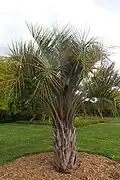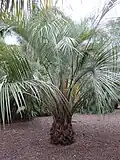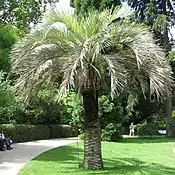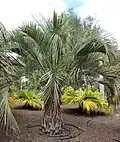| Butia | |
|---|---|
 | |
| Butia odorata | |
| Scientific classification | |
| Kingdom: | Plantae |
| Clade: | Tracheophytes |
| Clade: | Angiosperms |
| Clade: | Monocots |
| Clade: | Commelinids |
| Order: | Arecales |
| Family: | Arecaceae |
| Subfamily: | Arecoideae |
| Tribe: | Cocoseae |
| Genus: | Butia (Becc.) Becc.[1] |
| Type species | |
| Butia capitata | |
Butia is a genus of palms in the family Arecaceae, native to the South American countries of Brazil, Paraguay, Uruguay and Argentina.[2] Many species produce edible fruits, which are sometimes used to make alcoholic beverages and other foods. The name is derived from a Brazilian vernacular word for members of the genus.[3]
Description
These are 'feather palms', having pinnate leaves up to 3m long including petiole which usually have a distinct downward arch. The species vary from nearly stemless plants rarely exceeding 40 cm tall (e.g. Butia campicola) to small trees up to 12m tall (e.g. B. yatay).
Butia odorata is notable as one of the hardiest feather palms, tolerating temperatures down to about −10 °C; it is widely cultivated in warm temperate to subtropical regions.
Species
| Image | Scientific name | Distribution |
|---|---|---|
 | Butia archeri (Glassman) Glassman | Goiás, Brasília, Minas Gerais, São Paulo |
| Butia arenicola (Barb.Rodr.) Burret | Mato Grosso do Sul, Paraguay | |
| Butia campicola (Barb.Rodr.) Noblick | Mato Grosso do Sul, Paraguay | |
 | Butia capitata (Mart.) Becc. | Minas Gerais, Goiás, Bahia |
| Butia catarinensis Noblick & Lorenzi | Rio Grande do Sul, Santa Catarina | |
 | Butia eriospatha (Mart. ex Drude) Becc. – Woolly butia palm[7] | Paraná, Rio Grande do Sul, Santa Catarina |
| Butia exilata Deble & Marchiori | Rio Grande do Sul | |
| Butia exospadix Noblick | Mato Grosso do Sul, Paraguay | |
 | Butia lallemantii Deble & Marchiori | Rio Grande do Sul, Uruguay |
| Butia lepidotispatha Noblick | Mato Grosso do Sul, Paraguay | |
| Butia leptospatha (Burret) Noblick | Mato Grosso do Sul, Paraguay | |
| Butia marmorii Noblick | Alto Paraná in Paraguay | |
| Butia matogrossensis Noblick & Lorenzi | Mato Grosso do Sul | |
| Butia microspadix Burret | Paraná, São Paulo | |
 | Butia odorata (Barb.Rodr.) Noblick – South American jelly palm,[1] jelly palm,[1][7] pindo palm[1] | Rio Grande do Sul, Uruguay |
 | Butia paraguayensis (Barb.Rodr.) L.H.Bailey – Dwarf yatay palm[7] | Brazil, Argentina, Paraguay, Uruguay |
| Butia pubispatha Noblick & Lorenzi | Paraná | |
| Butia purpurascens Glassman | Goiás, Minas Gerais | |
| Butia witeckii K.Soares & S. Longhi | Rio Grande do Sul | |
 | Butia yatay (Mart.) Becc. – Jelly palm,[1][7] yatay palm[1][7] | Rio Grande do Sul, Uruguay, Argentina |
No longer accepted species:[4][5]
- Butia missionera Deble & Marchiori - Rio Grande do Sul
- Butia noblickii Deble - Corrientes Province of Argentina
- Butia quaraimana Deble & Marchiori - Rio Grande do Sul
- Butia stolonifera (Barb.Rodr.) Becc. - Uruguay
- Butia poni (Haum.) Burret - Misiones Province of Argentina
- Butia sp. nov. - Mato Grosso do Sul
Intergeneric hybrids
- × Butyagrus alegretensis K. Soares (B. lallemantii × Syagrus romanzoffiana)[4]
- × Butyagrus nabonnandii (Prosch.) Vorster (B. odorata × S. romanzoffiana)[9]
References
- 1 2 3 4 5 6 "Genus: Butia (Becc.) Becc". Germplasm Resources Information Network. United States Department of Agriculture. 2010-03-16. Archived from the original on 2012-10-22. Retrieved 2012-11-14.
- 1 2 Kew World Checklist of Selected Plant Families
- ↑ Quattrocchi, Umberto (2000). CRC World Dictionary of Plant Names. Vol. I: A-C. CRC Press. p. 389. ISBN 978-0-8493-2675-2.
- 1 2 3 Soares, Kelen Pureza; Longhi, Solon Jonas; Neto, Leopoldo Witeck; de Assis, Lucas Coelho (2014). "Palmeiras (Arecaceae) no Rio Grande do Sul, Brasil". Rodriguésia - Revista do Jardim Botânico do Rio de Janeiro (in Portuguese). 65 (1): 113–139. Retrieved 22 September 2018.
- 1 2 3 Soares, Kelen Pureza (2015). "Le genre Butia". Principes (in French). 1: 12–57. Retrieved 11 October 2018.
- ↑ Noblick, Larry (January 2014). "Butia: What we think we know about the genus". The Palm Journal - Journal of Oil Palm Research. 208: 5–23. Retrieved 11 October 2018.
- 1 2 3 4 5 Porcher, Michel H. (20 April 2003). "Sorting Butia names". Multilingual Multiscript Plant Name Database (MMPND). University of Melbourne. Retrieved 3 October 2018.
- ↑ Deble, Leonardo Paz; Keller, Héctor A.; Da Silva Alves, Fabiano (August 2017). "Resurrection and epitypification of Butia poni (Arecaceae), a neglected palm micro-endemic in the grasslands of Misiones, Argentina". Phytotaxa. 316 (2): 171–180. doi:10.11646/phytotaxa.316.2.6. Retrieved 14 September 2018.
- ↑ "Butyagrus nabonnandii". Palms. Palm & Cycad Societies of Australia. Archived from the original on 2013-05-19. Retrieved 2012-11-14.
